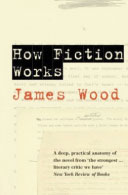
One of the nicer virtues of lifeness is that it lifts realism above the tyranny of verisimilitude. “Tutor” or “teach” (Wood’s verbs) don’t “lecture.” Be persuasive rather than dictatorial. Don’t natter on that sounds like nagging. I had been reminded of the important things in life, or at least the important things when dealing with one’s own creations: Respect them. I hope this isn’t taken the wrong way, but by the end of How Fiction Works, I felt as though I had just read a very wise guide to parenting. … Now if the brilliant ‘leggy’ is Nabokov’s word, then the hapless ‘thing’ is Pnin’s word, and Nabokov is here using a kind of free indirect style, probably without even thinking about it.” So “leggy thing” yields detail, metaphor, and “free indirect style.” It also opens a window onto two of the most pronounced characteristics of Nabokov’s style, visual acuity and narrative insouciance-or, at least, Wood’s reading of it does, which is the most you can ask of good reading.

But ‘thing’ is even better, precisely because it is vague: Pnin is lunging at the implement. With leggy, Wood writes, “we can instantly see the long legs of the wayward nutcracker, as if it were falling off the roof and walking away. Those are the narrator’s words for a nutcracker that slips and seems about to shatter a precious bowl in a sink full of soapy water and is grabbed for by Pnin, that awkward, unhappy Russian professor. Take his reading of the phrase “leggy thing,” which occurs in Nabokov’s novel Pnin. Wood fishes for these rhetorical devices in the choppy waters of actual novels, often emerging with several at once. Under the guise of a reader’s handbook, an introduction to the primary elements of fictional narrative (voice, detail, character, dialogue), Wood has written a manifesto-one with the singular feel of an etiquette manual, though none of its fussiness. He believes that there is a right way and a wrong way for novelists to comport themselves.

Wood, you might say, has a deep ethical commitment to literary tact. The charge is not false, exactly-Wood has written many harsh things about many contemporary novels-but in How Fiction Works he turns it upside down, revealing decorum and moral intensity to be the roots of a beautifully leafed-out aesthetic philosophy. He is an “elegant assassin,” says the Boston Globe. Wood is a “courtly eviscerator,” says n+1.

The epithet varies from venue to venue but always yokes together two presumably opposed attributes: polished manners and deadly ferocity. The Englishman James Wood, recently named The New Yorker’s chief book reviewer, by now comes to us wreathed in a Homeric epithet.


 0 kommentar(er)
0 kommentar(er)
